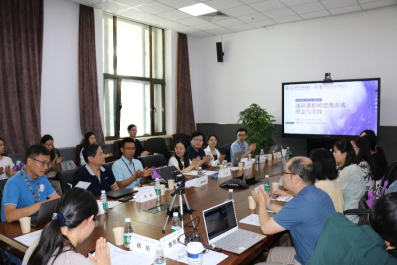
On the afternoon of August 29, Xinya College and the Teaching Center for Writing and Communication of Tsinghua University jointly held a seminar with the theme of "Thinking Development of Liberal Arts Education Courses: Ideas and Practices", as part of the 26th Education Work Symposium of Tsinghua University in Conference Room 212 of the Central Main Building. Attendees included Yang Fan, Deputy Director of the Office of Academic Affairs, Mei Ciqi, Dean of Xinya College, Cao Liuxing, Director of the Teaching Center for Writing and Communication, Ruan Dong, Head of the Party Work Group and Deputy Dean of Xinya College, Zhang Weite, Deputy Dean of Xinya College, Cheng Xiangyu, Deputy Director of the Teaching Center for Writing and Communication, as well as 18 teachers and students offline, and more than 150 teachers and students online. The seminar was chaired by Mei Ciqi.
First of all, Yang Fan, Deputy Director of the Office of Academic Affairs, delivered a speech. Ms. Yang reviewed the development of liberal arts education in Tsinghua University and highly affirmed the achievements and contributions made by Xinya College and the Teaching Center for Writing and Communication in the development and exploration of liberal arts education courses. She stressed that liberal arts education should not only lead students to understand the major opportunities and challenges at present and in the future, but also help them appreciate the ways of thinking of different disciplines, so as to foster deeper thinking and a broader vision.
In the first half of the seminar, course teachers and student representatives from Xinya College gave keynote speeches. Li Mu, a professor at the Academy of Arts & Design, Tsinghua University, took the course Art Enlightenment as an example to share his thinking development experience in the course of general arts. Mr. Li encouraged students to pay attention to the correlation between "content factors" and "form factors", and thus drive and trigger them to examine and understand the morphological structure of objects from a new perspective, so that they can deeply understand that art is a process of externalizing those things that only exist in our imagination into reality through different thinking paths.
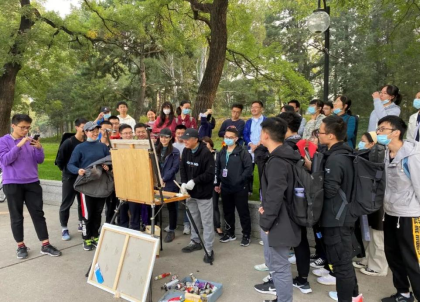
Art Enlightenment—campus painting
Li Zhen, Assistant Professor of Xinya College, shared his teaching experience on the topic of Thinking Training of Chinese Philosophy: Integrating, Analyzing and Comprehending—Based on the Teaching of Chinese Philosophy (1). Mr. Li proposed three keywords to realize teaching objectives of thinking training: Integrating is to establish one's own system on the basis of bringing together the thoughts of predecessors; analyzing focuses on training students' abilities of precise interpretation and deep thinking, thus improving the accuracy, clarity and depth of their thoughts; comprehending is to pay attention to the soul shaping in the dimension of value, and bring valuable, historical and warm wealth in China's philosophical tradition to students, rather than simply preaching or publicizing.

Group photo of Chinese Philosophy (1) class
Two students from Xinya College shared their understanding of liberal arts education based on their experience in attending relevant courses at the college. Zhao Linxi, majoring in Creative Design and Intelligent Engineering enrolled in 2020, believed that liberal arts education helps her receive training in logical thinking and problem awareness, and enables her to explore different professional fields with a broader perspective and inclusiveness. Li Qingyang, majoring in Physics enrolled in 2019, thought that liberal arts education courses and specialized courses complement each other. The study of liberal arts education courses strengthens thinking training, promotes the learning of specialized courses, and subtly cultivates students' personality and their value views.
In the second half of the seminar, teachers from the Teaching Center for Writing and Communication and student representatives of the course Writing and Communication shared their views on liberal arts education and thinking training in the course. Zhang Fen, a lecturer at the Center, gave a report titled Realizing Thinking Development in Diversified Interaction between Teachers and Students—Taking Lu Xun-themed General Writing Course as an Example. Ms. Zhang noted that cultivation of the general thinking ability should focus on the integration of interdisciplinary and diversified knowledge spaces, and the development of comprehensive abilities such as logical thinking and critical thinking. In the teaching process, teachers need to stimulate students' enthusiasm and interest in observing and understanding the objects of writing through sufficient classroom discussions, face-to-face feedback, after-class Q&A, homework correction and reading clubs. At the same time, teachers also need to provide students with a space for diversified knowledge, enhance the contextual awareness and the sense of history of texts, help them foster an effective problem awareness and a questioning spirit, and guide them to attach importance to the connection between texts and reality.
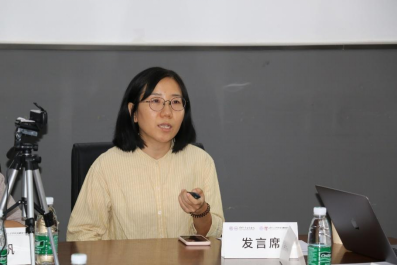
Ms. Zhang Fen
Jia Wenxu, a lecturer at the Center, delivered a report titled Reinterpretation of the Central Dogma of General Thinking Development—Taking the General Writing Course on the Theme of Infectious Diseases as an Example. Based on her academic research background and the teaching practice of the course Writing and Communication, Ms. Jia shared her understanding of general thinking, and introduced an effective path to help students develop general thinking by analogy with the central dogma in biology.
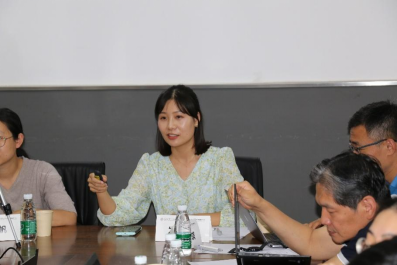
Ms. Jia Wenxu
Chen Siyu, majoring in English enrolled at the Department of Foreign Languages and Literatures, Tsinghua University in 2019, shared her destined encounter with and understanding of the course Writing and Communication as a student representative of the course. She believed that the course takes article writing training as the starting point to promote the development of students' multiple perspectives and logical thinking. The course encourages students to go out of the comfort zone of thinking and foster a breakthrough thinking, which stimulates students' courage to further explore in other fields in the future.
During the exchange of views, Ms. Cao Liuxing refined two important consensuses reached in the seminar. First, efforts should be made to maintain the creation of the interactive atmosphere between teachers and students in liberal arts education courses and the reading and writing training with a certain intensity, which have a long-term effect on the thinking breakthrough and perspective extension of teachers and students. Second, teachers of different liberal arts education courses understand the core concept in the development of general thinking and choose the teaching methods in a highly consistent manner. In the future, Xinya College, the Teaching Center for Writing and Communication and other units and teachers offering liberal arts education courses can strengthen exchanges on the basis of practice and enhance the effect of the courses on improving thinking.
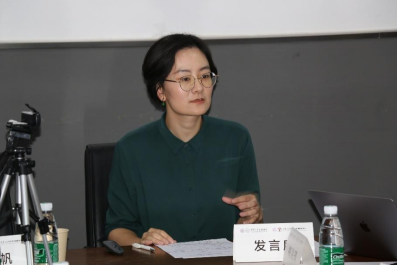
Ms. Cao Liuxing
Mr. Ruan Dong expressed recognition and delight for the positive role of liberal arts education in the development of students. According to his own academic experience, Mr. Ruan proposed that liberal arts education courses should include both liberal arts and sciences which complement each other. However, the passive receiving method in traditional education cannot extract the core ideas and approaches of general courses in mathematics and physics, so students cannot fully feel their unique charm and connotation. He hoped that the future general courses in mathematics and physics can tap into the true charm of the two disciplines, and that the construction of liberal arts education can strengthen the exchange between general courses in sciences and engineering and those in humanities and social sciences, so as to finally help students form their own academic style and taste.
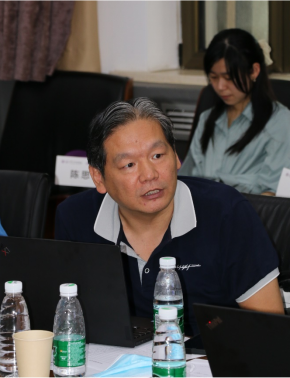
Mr. Ruan Dong
At last, Mr. Mei Ciqi summed up the seminar by citing the famous saying of thinker Blaise Pascal, "Man is a reed...a thinking reed." He believed that education that stresses the synergy of liberal arts education and specialized education is of great value to the overall growth of "a reed". While specialized education tries to present the world to students in the most intuitive and visible way, liberal arts education aims to help "reeds" develop more insightful thinking in the invisible direction. Mr. Mei expected that the faculty of Xinya College and the Teaching Center for Writing and Communication would reinforce exchanges in the future curriculum construction process, forge ahead with determination and dare to explore the way forward in liberal arts education, and form a liberal arts education concept and realization path with the Tsinghua style.